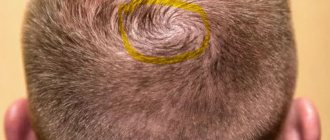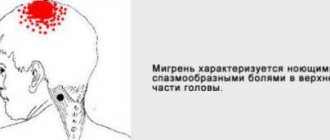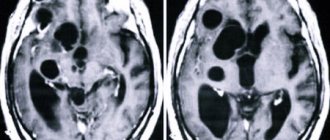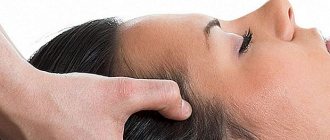When treating this symptom, an integrated approach is used that helps reduce its intensity and remove the cause of the neurotic disorder. Several types of assistance are used for this.
In life, a person faces various situations that strain his nervous system: there is no way to respond to grievances, fear arises due to a lack of a sense of security, it is not possible to implement plans, and so on. All conflict situations and shocks do not remain without a trace in the body. As a result of the action of psychotraumatic factors, a person develops the disease neurosis . It begins almost imperceptibly and manifests itself differently in everyone. Symptoms and external manifestations of the disease depend on the duration of the traumatic situation, its severity and individual reaction to it.
What is neurosis?
Neurosis is a disease in which a person loses the ability to cope with stressful situations . The body’s defenses and the formed psychological adaptation “break down” in this state, leading to exhaustion of the nervous system. This disease affects not only the psyche and the nervous system; a person often notices a malfunction of an internal organ or prolonged pain.
Subscribe to our INSTAGRAM account!
Strong neurosis does not go unnoticed from the outside either. People around note increased irritability and deterioration in the physical condition of a person suffering from this disease.
Causes of the disease
- An interesting fact is that not only situations associated with the loss of something close can lead to neurosis. The cause of the disease can also be a bright, joyful event , for example, the birth of a child, a wedding, or the start of studies at the desired college or university.
- Neurosis often occurs in melancholic and choleric people. These types of temperament are characterized by emotional instability, so typical melancholic and choleric people have a more difficult time experiencing traumatic situations.
- Physical and psycho-emotional stress ultimately lead to this nervous pathology. If a person constantly works or studies and does not have enough time for relaxation and rest, he is at risk. Especially with accompanying problems in your personal life, the development of neurosis cannot be avoided.
- With long-term or intense somatic illnesses, psychological problems associated with the inability to finish the work started, symptoms of severe neurosis also appear.
Tension headache
Cephalgia is divided into:
- primary – not associated with any organic or structural diseases;
- secondary - caused by infectious or viral diseases, vascular spasms, inflammation of nerve endings, pathological changes in vertebral structures, etc.
What is a headache
Cephalgia cannot be a sensation of the brain itself, since it does not contain pain receptors. It can only be felt by nine anatomical parts located in the head: the periosteum of the skull, nerve endings, muscle structures, arteries and veins, subcutaneous tissues, eyeballs, sinuses and mucous membranes.
Headaches occur due to irritation or tension of pain receptors in the listed areas. Receiving a stimulating effect, the receptors of sensitive areas transmit a signal of pain to the nerve cells of the brain, causing cephalgia.
Tension headache is a primary pain, it is quite difficult to diagnose and its etiology is not fully understood. It has specific features: mild to moderate dull or aching pain, monotonously squeezing, lasting from half an hour to several hours, and can be repeated frequently. As a rule, it is accompanied by irritability, nervousness, sometimes weakness, fatigue, sleep and appetite disturbances, light and noise sensitivity. In this case, the pain does not have pronounced attacks and pulsating nature, nausea and vomiting are absent.
Although tension cephalgia is not too severe, if it occurs frequently and is intense, it may cause the patient to need medical care and go to a headache treatment clinic. In other cases, analgesic drugs usually help to cope with pain.
Causes of tension headaches
Doctors believe that tension headaches are caused by spasms and tension in muscle structures. At the same time, the majority of patients are office workers leading a sedentary lifestyle. Causes of tension cephalalgia:
- chronic stressful situations;
- nervous and mental stress;
- staying in one position for a long time (for example, sitting at a computer monitor or driving a car);
- work associated with constant eye strain (seamstresses, laboratory workers, watchmakers or electronic workshops forced to look into a microscope for a long time, etc.);
- incorrect and uncomfortable body position during sleep;
- unusual physical activity, causing pain in the neck and lower part of the head;
- long-term use of analgesics or tranquilizers.
Factors that can trigger or aggravate tension pain:
- emotional breakdowns or depression, anxiety;
- sudden changes in weather;
- improper diet, diets, fasting;
- poor working conditions (basement, stuffy, poorly ventilated room, work at night);
- physical or mental stress and fatigue;
- bad habits (smoking, excessive alcohol consumption);
- violations of posture or curvature of the spine, the treatment and diagnosis of which is delayed or ignored by the patient.
Types and symptoms of cephalalgia
When treating tension headaches, a distinction is made between chronic and episodic forms of cephalgia. Episodic pain is defined as “normal,” “usual,” or “everyday” pain that lasts from half an hour to several hours. The frequency of attacks (episodes) in different people and at different periods of time can be different (from one to 15 times a month).
Tension headaches that recur more than 15 times a month are considered chronic. In some cases, it does not go away completely, but only becomes slightly dull, which can lead to loss of ability to work or normal life activities.
Tension cephalalgia is characterized by bilateral pressing sensations (a compressive band on the head) extending to the back of the head and neck.
How to help yourself during an attack? Which doctor should I contact?
Take a break, relax, lie down if possible, or take a warm bath. During working hours, you can drink tea, take a leisurely walk and get a neck-collar massage. If the pain cannot be tolerated, take painkillers: analgin, aspirin, ibuprofen. Some patients find citramon or paracetamol more helpful, but it is not recommended to abuse medications, as they simply relieve pain without affecting the causes of the disease.
Try to spend more time outdoors, do morning exercises, and walk. During stressful situations, breathing exercises, yoga, and manual therapy sessions (acupuncture, reflexology, relaxation therapy, plantar massage by Dr. Bobyr, etc.) will help you cope with the sensations.
For chronic tension pain, you should contact a headache center or clinic at your place of residence.
Initially, this is an appointment with a local therapist or family doctor; later, he may prescribe an examination and consultation with a neurologist, vertebrologist or other specialists. Author: K.M.N., Academician of the Russian Academy of Medical Sciences M.A. Bobyr
How does this disease manifest itself?
A neurotic disorder of the nervous system necessarily leads to detrimental consequences for the body and social activity of a person. It can cause neurosis, nausea, dizziness, constant headaches, increased conflict, irritability, and disability. That is why, when neurosis manifests itself, you need to solve the problem, and not hope for its independent disappearance .
The main manifestations of the disease include:
- headaches of various types;
- numbness of the limbs;
- dizziness;
- various types of sleep disorders;
- a person cannot relax if he wants to;
- increased irritability;
- the patient does not feel joy and happiness, he is constantly depressed;
- restlessness, anxiety;
- decrease in cognitive functions, intellectual abilities;
- fast fatiguability;
- pain in internal organs, in the limbs, without obvious reasons;
- decreased labor productivity;
- mood swings;
- tearfulness;
- touchiness;
- “getting stuck” in a stressful situation;
- the body's sensitivity to temperature changes and bright light;
- disorders of the autonomic nervous system: sweating, rapid heartbeat, fluctuations in blood pressure, problems with the stomach;
- decreased sex drive;
- decrease in the intensity of volitional impulses;
- dyspnea;
- dark spots when closing or opening the eyes, the condition is accompanied by dizziness;
- decreased appetite, inability to form a bolus due to insufficient amount of saliva in the mouth;
- the appearance of a feeling of fear without a threatening factor.
Reduced severity of physiological symptoms
The listed signs manifest themselves differently in each patient. For some, neurosis is accompanied by only a few symptoms of the listed manifestations, and some note almost all of the listed changes in their body. Among the common symptoms, patients note headache, nausea, dizziness, tension in the body and head.
Tension in the body
This is the main companion of the disease. Neurotic disorders are almost always accompanied by muscle tension. This phenomenon occurs for both physiological and psychological reasons. In the human body, an uneven distribution of muscle load occurs, and dystonic reactions appear.
Some researchers argue that tension in any part of the body is associated with specific psychological problems. For example:
- Feelings of hostility towards others lead to tense arm muscles.
- Increased muscle tone in the thighs and pelvis in adulthood is caused by sexual problems.
- Tension in the head during neurosis is caused by deep emotions, unresolved conflicts, and low self-esteem of a person.
Psychological problems are very closely related to somatic manifestations. That is why it is necessary to get rid of this symptom as part of a set of measures to overcome a neurotic disorder.
With neurosis, constant tension in the body is treated not only with medications, but also with active use of physical exercises. They are prescribed depending on which muscles cannot relax. The following would be appropriate here:
- relaxation massages;
- various water treatments;
- medications for severe symptoms;
- working with a psychologist, psychotherapist to solve the cause of muscle tightness.
Nausea with neurosis
Not all doctors associate this symptom with psychological problems. Only experienced gastroenterologists or therapists refer the patient for a consultation with a psychotherapist or neurologist when experiencing nausea. Nausea with neurosis can last from several hours to several days. And it should not be associated with low-quality food and take sorbents or bacteria for the intestinal flora - there will be absolutely no result.
Constant nausea in neurosis is often observed with a feeling of disgust towards an object, person or activity, if the patient has accumulated grievances, he is dissatisfied with his life, his health or appearance. Constantly interacting with what a person considers unworthy or bad, neurosis will manifest itself through the main symptom - nausea.
There are two treatment options:
- reducing the severity of symptoms, short-term techniques using antipsychotics or antidepressants;
- long-term psychotherapy aimed at eliminating not only the symptom, but also the causes of neurosis.
Dizziness with this disease
It is enough to associate this phenomenon with the pathology of the nervous system, since dizziness during neurosis is not always accompanied by problems with internal organs. A person may complain of weakness and dizziness, although when tested, all results will be within the normal range; blood pressure measurements will also not show any pathology. In this case, we can safely say that the symptom is caused by psychogenic causes.
Dizziness occurs with depression, panic attacks, vegetative-vascular dystonia, phobias, and anxiety. It is complemented by noise in the head, increased irritability and sleep disorders. With dizziness of a psychogenic nature, it is impossible to cure a person of them without the use of psychotherapeutic techniques.
If dizziness is accompanied by hearing problems and gait disturbances, then we may be talking about disturbances in the functioning of the vestibular apparatus. In this case, an ENT doctor provides assistance. With changes in blood tests and examinations of the cardiovascular system, dizziness is caused by neurological or vascular diseases. A doctor working with a patient cannot immediately diagnose psychogenic dizziness, so first a negative diagnosis should be made - eliminating the physiological causes of the symptom.
In the treatment of dizziness due to neurosis, medications, special gymnastics and breathing exercises, as well as psychotherapeutic techniques are used.
The difference between tension in the head and migraine
Tension in the head and headache should be distinguished from each other. Tension in the head is usually not as severe as a headache; it is quite tolerable and does not cause pronounced discomfort.
Tension in the head has the effect of squeezing the head, as if with a rope; it does not increase after physical exertion and is limited in time from several minutes to several days in a row. A tension headache does not cause nausea or gag reflexes in a person. The situation is aggravated if you suffer from a bad stomach.
In this case, you should never skip meals, since a state of hunger can easily cause tension in the head. This type of tension can also bother you with other ailments where hemoglobin decreases.
Headache due to neurosis, causes
Headache is a faithful companion of neurasthenia and hysteria; it is practically not observed in obsessive-compulsive neurosis. This symptom does not occur immediately after a stressful situation, but after a certain period of time, after the development of other symptoms, for example, sleep or appetite disorders.
Headache with neurosis manifests itself in different ways, depending on the location of pain and the human organs involved. It develops due to:
- Muscle “clamps”.
- Disturbances in the functioning of cerebral vessels.
- Without disruption of muscles and blood vessels.
As a result of this classification, the symptoms of headaches with neurosis will be slightly different.
Neuromuscular pain is accompanied by:
- feeling of squeezing of the head;
- numbness of some parts of the surface of the head;
- sensation of pain on the skin surface of this part of the body;
- a person feels constant tension in the head, which interferes with mental processes: it is difficult to remember something, concentrate attention, or decide.
The neurovascular nature of pain will be expressed through the following symptoms:
- throbbing pain in the head;
- pulsation constantly focuses a person’s attention on pain, he cannot perform any complex mental work;
- often localized in the temporal region, occipital and frontal;
- accompanied by nausea and weakness.
Headache without muscle tension and pulsation in a neurotic disorder occurs after overwork. It does not have a clear localization, and it is difficult to understand the nature of the pain. Its occurrence is associated with psycho-emotional experiences, so it is classified as neurotic symptoms.
Treatment of tension headaches
It is better to start treatment immediately, when the first symptoms appear, while they are not yet very strong. Don't delay visiting the doctor! Painkillers and sedatives are used to relieve attacks. Depending on the severity of the disease, your doctor may recommend medications to prevent attacks: antidepressants, anticonvulsants, muscle relaxants.
Recommendations to help you keep the disease under control:
- Follow your doctor's recommendations. As soon as pain occurs, take the prescribed medications, do not tolerate it.
- Avoid stress. It is useful to use relaxation practices.
- If you know that certain factors provoke your attacks, avoid them.
- Some people find hot baths and ice packs helpful.
A neurologist at our neurology clinic will be able to correctly assess your condition, figure out why pain attacks are bothering you, and prescribe effective treatment for tension headaches. Make an appointment by phone
The material was prepared by Natalya Yurievna, a neurologist at the international clinic Medica24, Candidate of Medical Sciences Lasch.
How to get rid of neurotic headaches?
It is important for patients with a neurotic disorder to know how to relieve tension and pain in the head during neurosis, because their livelihoods depend on it. When treating this symptom, an integrated approach is used that helps reduce its intensity and remove the cause of the neurotic disorder. To achieve this, several types of patient assistance are used.
Medication assistance
With neuroses, pain in the head can be simply unbearable. A constant feeling of heaviness, constriction and increased severity of pain leads to a deterioration in the patient’s psycho-emotional state. He becomes irritable, gets tired quickly, and does not want to use anything for food, since the chewing process also causes pain. To solve this problem, it is necessary to use medications to get rid of headaches. To do this, the doctor prescribes:
- sedative herbal preparations (Valerian, Peony Tincture, preparations with motherwort, Nervo-Vit);
- painkillers that relieve muscle or vascular spasm (Spazmolgon, Riabal, Novigan, various analgesics and others);
- vitamins to support the functioning of the heart and nervous system (various vitamin complexes with vitamins C, group B, magnesium, iron and other microelements);
- nootropics and anti-anxiety drugs (Glycised, Glycine, Nootropil, Pantogam), they have a good effect on brain function and normalize sleep, but the dosage and course of administration are determined only by a doctor.
Psychotherapeutic assistance
Psychological techniques are used not only to treat headaches, but also to get rid of the causes of neurosis. Cognitive behavioral therapy is actively used, hypnosis is an effective assistant, and it is also important to use positive therapy methods to restore a person’s psycho-emotional sphere. Long-term work with a psychologist or psychotherapist is required.
Lifestyle change
Often a person causes himself to develop neurotic headaches by exposing himself to excessive mental or physical stress.
To avoid the development of this symptom into pathology, restoration of the body's strength is required: healthy sleep, work and rest regime, you can help yourself by using aromatherapy, therapeutic exercises, doing massages, water procedures, tuning into the positive and learning positive thinking. Published by econet.ru.
PS And remember, just by changing your consciousness, we are changing the world together! © econet
How to relieve tension in your head?
A healthy lifestyle, proper nutrition, regular walks in the fresh air, and a change of environment do not guarantee relief from neurotic disorders. The latter creep up unnoticed. Few people pay attention to the first alarm bells of neurosis. Do you have a headache, don’t get enough sleep, become irritated more often, lash out at others, do you take any negativity to heart? It's not "just nerves." The body gives a signal: its work is disrupted and urgently requires adjustments!
Why do you have a headache and no strength to work or live fully?
Surveys confirm that people suffering from neuroses often do not find understanding among their family and friends. Why? Others perceive post-stress disorders as whims and do not notice the symptoms of neurotic conditions.
From the first visit to the SPA salon, Orchid clients find loyal allies in the fight for their health and receive effective comprehensive assistance, including psychological assistance.
The latest advances in pharmacology have played a cruel joke. The habit of getting rid of pain symptoms, loss of strength, apathy, emotional excitability, and insomnia through pills, drops, and injections has led to dependence on medications. The latter do not fully solve the problem of how to relieve tension in the head.
Due to the constant use of drugs, the body weakens and ceases to resist neurotic syndromes. They disrupt and block self-healing mechanisms, causing diseases of the gastrointestinal tract, respiratory, muscular, and cardiovascular systems. If timely measures are not taken, neurosis will take on a chronic form, leading to irreversible destruction of the body and 100% loss of health.
Where does recovery begin?
Don't know how to relieve tension in your head?
You are being hindered by:
- False hopes that a series of troubles will one day end and your health will improve.
- Fear to admit the fact of problems with the nervous system.
- A careless attitude towards one's own interests.
- Inability to respect, value, and take care of health.
Start by understanding a simple truth: true healing occurs only in favorable conditions . Do you think that within Moscow it is impossible to radically change the situation, to find balance and peace of mind? You are mistaken! Each of the spa salons has created a unique VIP environment for complete recovery from stress, physical and emotional overload, nervous breakdowns, and depressive states.








